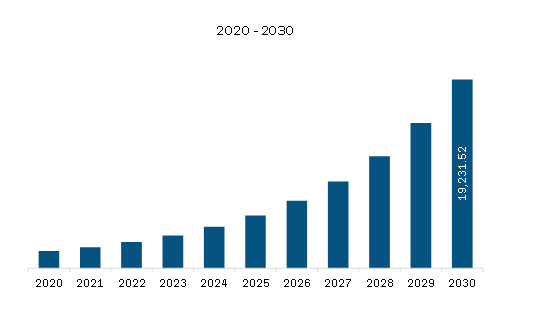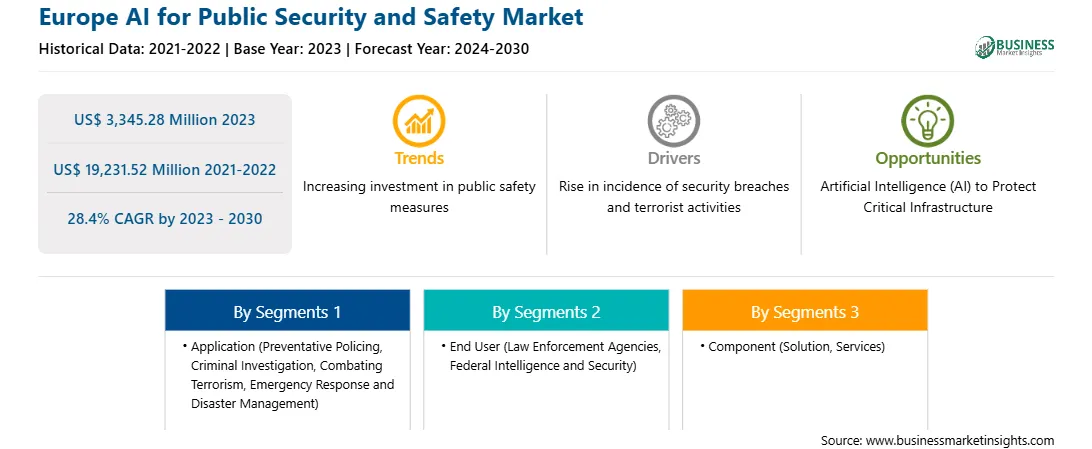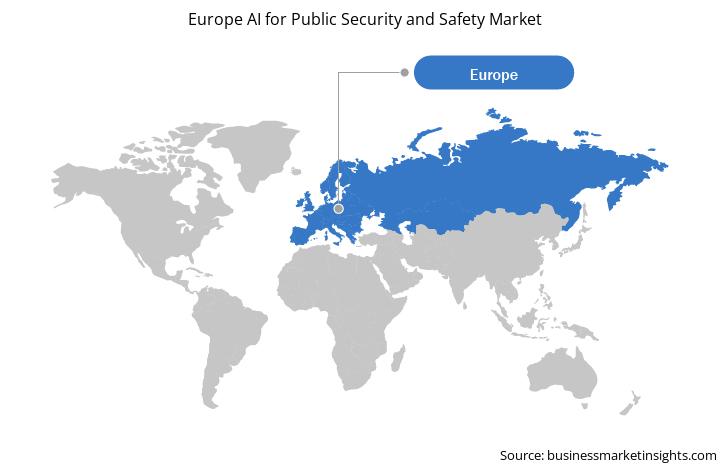Europe AI for Public Security and Safety Market
No. of Pages: 157 | Report Code: BMIRE00028725 | Category: Technology, Media and Telecommunications
No. of Pages: 157 | Report Code: BMIRE00028725 | Category: Technology, Media and Telecommunications
The nature of terrorist threats has changed significantly over the past years with the discovery and use of new technologies by these organizations. Previously, governments and (re)insurers structured their containment strategies and responses to tackle large-scale attacks. However, they have begun focusing on cyberterrorism, which has emerged as a new threat, necessitating the adoption of advanced security systems. Oliver Wyman, a subsidiary of Guy Carpenter, projects that 30 billion connected devices would be in use by 2030, leaving more assets vulnerable to attack and greater scope to exploit. A shift has begun in the nature of cyber incidents, right from affecting primarily consumers to impacting global political or economic systems. In addition, the expansion and diversification of criminal networks and activities result in threats to public safety and democratic institutions’ security, affecting overall economic stability. The Russia–Ukraine crisis that began in February 2022 included physical fighting and cyberattacks, which involved displacing thousands and killing many people. FortiGuard Labs detected a new Viper malware to attack Ukrainian targets, installed on many computers in the country. Moreover, several sophisticated attacks have targeted several Ukrainian organizations via KillDisk and HermeticWiper malware strains capable of destroying data on devices. The Remote Manipulator System (RMS), a remote device control tool, was also found to have been distributed in Ukraine via fake "evacuation plan" e-mails. Further, a wave of distributed denial-of-service (DDoS) attacks in Ukraine included an attack on the state Savings Bank, affecting banking services and cash withdrawals from ATMs and disrupting the networks of defense departments and armed forces. AI has profoundly impacted society and received significant attention worldwide as a tool that can process vast volumes of data, and discover patterns and correlations in the given data, surpassing human’s capability and improving the effectiveness and efficiency of complex information analysis. As AI is a general-purpose technology, such advantages can also be used in counterterrorism. There is also growing interest among law enforcement and counterterrorism agencies worldwide to explore the transformative potential of AI in their operations. It also enables law enforcement authorities to expand their existing capacities and cope with the massive increase in data volumes. AI automates highly repetitive tasks to reduce workloads, helps analysts predict future terror attacks in well-defined and narrowly defined situations, identify suspicious financial transactions with terror financing, and aid in keeping watch on internet spaces for terrorist activities at a scale and speed beyond traditionally available human capabilities. Therefore, AI has significant potential to contribute to the fight against terrorism.
Europe is increasingly putting legal framework and global standards in place to ensure that AI developments and progresses can flourish for the good in citizen’s life. Artificial Intelligence (AI) provides opportunities to address societal challenges, such as climate change and public health. However, to ensure safety, European organizations were increasingly adopting AI technology. For instance, according to Eurostat, 8% of European enterprises used artificial intelligence technologies in 2021, while 28% of large European enterprises used artificial intelligence technologies. Further, to handle privacy issues, the EU is focusing on developing strategies that aim to boost research and development activities in AI while ensuring the safety and fundamental rights of the population. The EU introduced European AI Strategy that helps to build a resilient Europe for the Digital Decade. The European AI Strategy aims at making the EU a world-class hub for AI and ensuring that AI is human-centric and trustworthy. Such an objective translates into the European approach to excellence and trust through concrete rules and actions. Enabling the development and uptake of AI in the EU, ensuring that AI works for people and is a force for good in society, building strategic leadership in high-impact sectors, and making the EU where AI thrives from the lab to the market will help the EU to achieve development in AI. Increasing investments to improve the security of AI technology and to develop AI technologies for public security fuel the growth of the European AI for public security and safety market.
Strategic insights for the Europe AI for Public Security and Safety provides data-driven analysis of the industry landscape, including current trends, key players, and regional nuances. These insights offer actionable recommendations, enabling readers to differentiate themselves from competitors by identifying untapped segments or developing unique value propositions. Leveraging data analytics, these insights help industry players anticipate the market shifts, whether investors, manufacturers, or other stakeholders. A future-oriented perspective is essential, helping stakeholders anticipate market shifts and position themselves for long-term success in this dynamic region. Ultimately, effective strategic insights empower readers to make informed decisions that drive profitability and achieve their business objectives within the market. The geographic scope of the Europe AI for Public Security and Safety refers to the specific areas in which a business operates and competes. Understanding local distinctions, such as diverse consumer preferences (e.g., demand for specific plug types or battery backup durations), varying economic conditions, and regulatory environments, is crucial for tailoring strategies to specific markets. Businesses can expand their reach by identifying underserved areas or adapting their offerings to meet local demands. A clear market focus allows for more effective resource allocation, targeted marketing campaigns, and better positioning against local competitors, ultimately driving growth in those targeted areas.
Europe AI for Public Security and Safety Strategic Insights

Europe AI for Public Security and Safety Report Scope
Report Attribute
Details
Market size in 2023
US$ 3,345.28 Million
Market Size by 2030
US$ 19,231.52 Million
Global CAGR (2023 - 2030)
28.4%
Historical Data
2021-2022
Forecast period
2024-2030
Segments Covered
By Application
By End User
By Component
Regions and Countries Covered
Europe
Market leaders and key company profiles
Europe AI for Public Security and Safety Regional Insights

Europe AI for Public Security and Safety Market Segmentation
The Europe AI for public security and safety market is segmented into application, end user, component, and country.
Based on application, the Europe AI for public security and safety market is segmented into preventative policing, criminal investigation, combating terrorism, emergency response and disaster management, and others. In 2023, the preventative policing segment registered a largest share in the Europe AI for public security and safety market.
Based on component, the Europe AI for public security and safety market is bifurcated into solution and services. In 2023, the solution segment registered a larger share in the Europe AI for public security and safety market.
Based on end-use industry, the Europe AI for public security and safety market is segmented into law enforcement agencies, federal intelligence and security, and others. In 2023, the law enforcement agencies segment registered a largest share in the Europe AI for public security and safety market.
Based on country, the Europe AI for public security and safety market is segmented into the UK, Germany, France, Italy, Russia, and the Rest of Europe. In 2023, the UK segment registered a largest share in the Europe AI for public security and safety market.
Atos SE, Hexagon AB, Hitachi Ltd, Honeywell International Inc, International Business Machines Corp, Motorola Solutions Inc, Thales SA, Veritone Inc, Voyager Labs Ltd, and XenonStack Pvt Ltd are the leading companies operating in the Europe AI for public security and safety market.
The Europe AI for Public Security and Safety Market is valued at US$ 3,345.28 Million in 2023, it is projected to reach US$ 19,231.52 Million by 2030.
As per our report Europe AI for Public Security and Safety Market, the market size is valued at US$ 3,345.28 Million in 2023, projecting it to reach US$ 19,231.52 Million by 2030. This translates to a CAGR of approximately 28.4% during the forecast period.
The Europe AI for Public Security and Safety Market report typically cover these key segments-
The historic period, base year, and forecast period can vary slightly depending on the specific market research report. However, for the Europe AI for Public Security and Safety Market report:
The Europe AI for Public Security and Safety Market is populated by several key players, each contributing to its growth and innovation. Some of the major players include:
The Europe AI for Public Security and Safety Market report is valuable for diverse stakeholders, including:
Essentially, anyone involved in or considering involvement in the Europe AI for Public Security and Safety Market value chain can benefit from the information contained in a comprehensive market report.